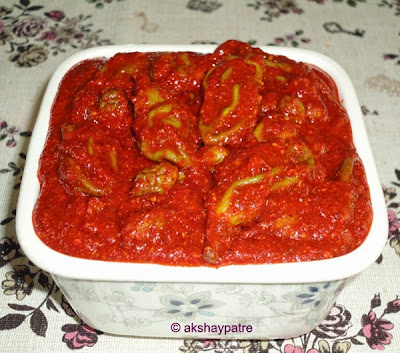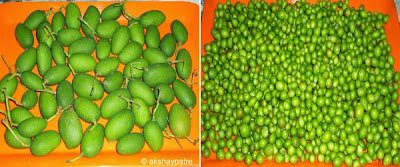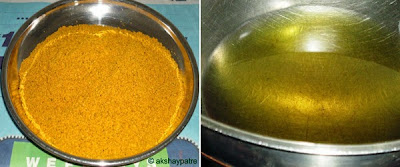Mavina Midi Karja Uppinakayi - Tender mango pickle is generally made in two steps. First step is to prepare the salted tender mangoes in brine and the second one is making pickle out of it . For the salted mangoes you need to keep the tender mangoes in salt for at least 15 - 20 days. For a good quality pickle, choosing the proper mangoes is also important.
It is very essential to pick the very tender, even sized mangoes with fresh stems. Green spotless tender mangoes make a durable and tasty pickle. I have also used karja (tender carissa carandas / karvand) along with tender mangoes while preparing this pickle. Karja is available in forest and tender karja is used to prepare pickle. It is available in Mumbai market in the month of March. Like salted tender mangoes, salted karja is also prepared in brine before pickling it.
You can either make the mango and karja pickle together or salted them together in brine and make the pickle separately. If you don't find karja, you can use this recipe to make pickle with tender mangoes only. My previous post was green chilli pickle and I have used the similar split mustard seeds and fenugreek seeds powder to make this pickle.
Some other interesting pickle recipes in this space
It is very essential to pick the very tender, even sized mangoes with fresh stems. Green spotless tender mangoes make a durable and tasty pickle. I have also used karja (tender carissa carandas / karvand) along with tender mangoes while preparing this pickle. Karja is available in forest and tender karja is used to prepare pickle. It is available in Mumbai market in the month of March. Like salted tender mangoes, salted karja is also prepared in brine before pickling it.
You can either make the mango and karja pickle together or salted them together in brine and make the pickle separately. If you don't find karja, you can use this recipe to make pickle with tender mangoes only. My previous post was green chilli pickle and I have used the similar split mustard seeds and fenugreek seeds powder to make this pickle.
Some other interesting pickle recipes in this space
Mavina Midi Karja Uppinkayi - Mango Pickle Recipe


Prep time : 30 mins
Cook time : 5 mins
Total time : 35 mins
Recipe type : Pickle
Cuisine : Karnataka
Yield : A large jarful of pickle
Author : Vidya Chandrahas
Cook time : 5 mins
Total time : 35 mins
Recipe type : Pickle
Cuisine : Karnataka
Yield : A large jarful of pickle
Author : Vidya Chandrahas
Ingredients
- 50 tender mangoes / ambe midi / mavina midi
- 1 ½ kg tender carissa carandas / karja / karvand
- 2½ cups salt
For the paste
- 2 cups oil
- 2 heaped tsp asafoetida / hing powder
- 2 tsp turmeric powder / haldi powder
- 3 cups red chilli powder
For the powder
- 50 grams fenugreek seeds / methi
- 150 grams husked split mustard seeds / sasma dali
Method
- Wash the mangoes and karja / karvand separately and pat dry. Spread them on a thin cloth for an hour or till they dry.
- Spread salt, mangoes and karja / karvand in layers in an airtight jar, cover with lid and keep it aside. Shake the jar every alternate day till the mangoes and karjas/ karvand are salted in brine. It may take 12 - 15 days.
- In a large vessel, drain the brine in which mango karja was salted. Spread the salted mangoes and karja on a thin cloth, let them dry completely. Remove the dried mangoes and karja onto a dry plate. Set aside. Bring the brine to boil till the salt settle down. Cool it, drain and keep aside.
- Heat a pan and roast the methi and split mustard seeds separately until golden brown and aromatic. Allow to cool. Then grind it to a fine powder and set aside.
- Heat oil in a pan. Let the oil get well heated. Switch off the flame. Add the hing powder, turmeric powder and mix well. Let the mixture become warm. When the mixture is warm, add all the boiled, drained and cooled brine, add the powder prepared above (methi-mustard powder). Mix well. Add the red chilli powder and make a thick dosa batter consistency paste. Note: Taste a little bit of paste to check the salt. If required add salt as per your taste / requirement.
- Add the salted mangoes and karja. Mix well. Transfer the pickle to an airtight jar. Spread 1/2 tsp of salt on the top. Heat 1 tbsp of oil, cool it and pour on the pickle. Cover the lid tightly and kep the jar in a dry place. The pickle will be ready to use after 10-12 days.
- This kairi karvand achar can be stored for about a year.
- Here salt is the preservative, hence sufficient salt should be used so that the pickle doesn't get spoiled.
- Before storing the pickle, taste some paste and adjust the salt.
- Heat 1 tbsp of oil, cool it and then pour it on the pickle in the jar for better shelf life.
Mango pickle - step by step pictures
1. Wash the mangoes and karja / karvand separately and pat dry. Spread them on a thin cloth for an hour or till they dry.
3. In a large vessel, drain the brine in which mango karja was salted. Spread the salted mangoes and karja on a thin cloth, let them dry completely. Remove the dried mangoes and karja onto a dry plate. Set aside. Bring the brine to boil till the salt settle down. Cool it, drain and keep aside.
4. Heat a pan and roast the methi and split mustard seeds separately until golden brown and aromatic. Allow to cool. Then grind it to a fine powder and set aside.
5. Heat oil in a pan. Let the oil get well heated. Switch off the flame. Add the hing powder, turmeric powder and mix well. Let the mixture become warm. When the mixture is warm, add all the boiled, drained and cooled brine, add the powder prepared above (methi-mustard powder). Mix well. Add the red chilli powder and make a thick dosa batter consistency paste. Note: Taste a little bit of paste to check the salt. If required add salt as per your taste / requirement.
6. Add the salted mangoes and karja. Mix well. Transfer the pickle to an airtight jar. Spread 1/2 tsp of salt on the top. Heat 1 tbsp of oil, cool it and pour on the pickle. Cover the lid tightly and kep the jar in a dry place. The pickle will be ready to use after 10-12 days.
7. This kairi karvand achar can be stored for about a year.








A different and interesting style of making pickle....... :)
ReplyDeletewow..mouthwatering!!
ReplyDeleteYo yo mouthwatering pickle
ReplyDeleteit's luking hot n delicious.
ReplyDelete